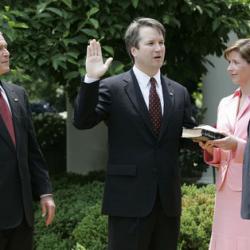The second testimony I wanted to engage claims that religious people are “too hooked on truth.” By this, the author means: “They all tell you exactly how things are, with absolute certainty. Almost like only their version of reality is the truth.” An immediate edit I would make is to remove the “almost like” from the second line. Many Christians are “absolutely certain” that they know “exactly how everything is.”
The author of this testimony is familiar enough with the Bible to know that “even in the Gospels, when Pilot asked Jesus what truth is, he did not respond.” Of course, this is not entirely true. In the same gospel of John, Jesus says, “I am the truth and the life.” Pilate was responding to Jesus’ testimony: “The reason I was born and came into the world is to testify to the truth. Everyone on the side of truth listens to me” (John 18:37).
But there is a sense in which the author is right. The truth that Jesus is talking about is not a perfectly communicable, self-evident logical statement. He would not have an answer to give to Pilate’s question other than to say, “I am the truth,” since He’s the Word of God. The other thing that shouldn’t be irrelevant to the conversation is the specific connotation that the Greek word for truth has. The word aletheia is the negation of lanthano (to hide), so truth is the revelation of something hidden as opposed to the plainly obvious summary of the gathered empirical evidence.
The author of the testimony makes a connection between anxiety and the need to know everything about the truth:
I honestly think that a need to have ultimate truth is just anxiety. With anxiety, something biologically goes awry, or some stresses within our own reality go wrong, that triggers bad biological responses. Yet this is what happens with any set of dogmatic beliefs. If that is not more confusing, we are expected to accept all these abstract beliefs we cannot even fathom, which end up creating more questions, and more abstract answers.
I have written previously that there is an ungodly kind of fear at play when people cling too tightly safe answers and simple belief systems. At the same time, there has to be a point at which we simply accept provisionally the “abstract beliefs we cannot even fathom” and move forward on that basis rather than staying in an infinite loop of question asking. The perpetual question-asker and the über-dogmatist both have the same impossible expectation: to grasp an infinite truth with finite perfection. Both need a strong dose of humility.
It’s instructive that the questions the author of this testimony relates all have to do with the afterlife:
Do I think that some essence of the deceased lives on? I believe so, but I am not 100% certain, or let alone have any one answers. Who says that any one thing has to happen? Could we just exist for a lifetime, many, infinite? I don’t know. Does the past just go to the world of the unreal? I don’t know.
One of the most devastating developments in Christianity has been its infatuation with abstract speculative questions like this. Though we do believe in resurrection and eternal communion with God, there is a lot that we shouldn’t pretend to know about what that will really look like. And I don’t think it’s fruitful to spend our time speculating about it with the Tim LaHayes and Todd Burpos of the world. It’s really an embarrassment when Christians promote books claiming to present an account of what heaven is “really” like.
The author continues by sharing about his own comprehension of this-worldly knowledge:
I know right from wrong. I try to find purpose in my life. I can enjoy and respect the very essence of nature and the human spirit. I can look at awe at things beyond my comprehension, like a supreme God. I can see good come from suffering. I can see the amazement of science, history, and cultural studies. I dont see religion itself as BS. In fact, every religion has useful teachings for anyone’s life. The problem I see is that we use religion as the answer all. We dont need dogma to define ultimate truth, let alone even need to know ultimate truth.
Not to be cheeky, but “knowing right from wrong” seems like an awfully big abstract truth to claim. I still don’t know right from wrong and I expend all kinds of anxiety wrestling through that one. What if I were to say that what Christian doctrine really amounts to is a history of grappling with “awe at things beyond our comprehension.” We pay attention to the words other people in the past have used to describe their awe because it gives us something to build off of.
The reason heresies aren’t true is because they don’t work. The original Greek word for heresy, hairesis, means “faction.” Heresies are beliefs that cause division and controversy like saying that Jesus wasn’t really human or wasn’t really divine or saying that the Old Testament God is an evil demon and Jesus is the good God. Despite the clairvoyance that certain Christians have arrogated to themselves, our vantage point for distinguishing truth from falsehood isn’t on the other side of God’s mystery where we could speak with absolute certainty. We can only say what the past has shown to work and not work in the sense of helping people to “know right from wrong,” “find their purpose,” and “enjoy and respect the essence of nature and the human spirit.”
I find myself best able to accomplish these things when I understand myself to be a weak vessel in the hands of a strong and merciful God who created a means for me to be part of the authentic human community that I call the body of Christ. I have also decided to put a boundary around a collection of letters, testimonies, and poems that a group of people 17 or so centuries ago decided to treat as uniquely inspired testimony about the “awe at things beyond our comprehension.” Treating the words inside that boundary as a basis for interpreting the reality I encounter outside of it helps my life of truth-seeking not to be endless anxiety. I don’t need to have the “answer all” or “define ultimate truth.” I just need some kind of framework within which to conduct what I consider to be a delightful journey of awe and amazement.










